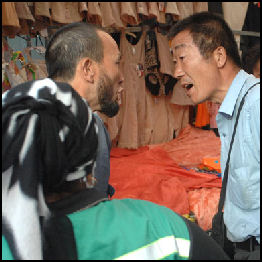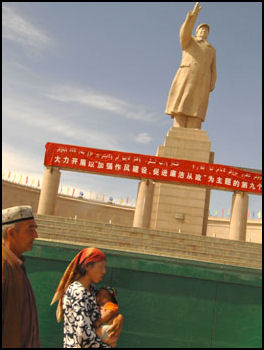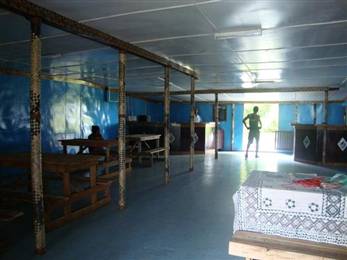Completely different from all I had experienced in China before was my far too short stay in Xinjiang.
I thought that Ürümqi (the capital of Xinjiang) was just another Chinese no-name-city and would be boring, and I therefore tried to get out as fast as possible, hence applying for an express-visa (3 working days) to Kyrgyzstan, instead of a normal application (5 working days).
In China there's a saying (somehow like this at least): “If you want to know how big China is, go all the way to Ürümqi in Xinjiang. And if you want to know how big Xinjiang is, go all the way to Kashgar”. And it’s true: Kashgar, the cultural and touristic hot spot of the region would have been another 26h further train on the train – too far for just a short side-trip I decided. Furthermore, as I really wanted to start travelling to Central Asia I had decided not to visit other places in Xinjiang and spare that for a future trip (you can’t imagine how many future trips pile up during such a trip…). It’s a shame though that I now only saw Ürümqi, which is not really an appealing city and can hardly represent what this region stays for. However, thanks to my CS-host Ebi my stay in Ürümqi got a whole different aspect. He was really helpful when I wanted to change my trainticket, buy bustickets for my further travels and even more when my wallet and camera got stolen. But there was so much more than that! Thanks to him I got a really deep insight into the Uyghur culture and traditions (well, as deep as it can be after 3 days).
Xinjiang is officially called “Xinjiang Uyghur Autonomous Region”, because the biggest minority group here are the Uyghur people, who used to be the majority in the region. Official Chinese policy – moving as many Han Chinese into the region as possible (giving them jobs, homes and good opportunities straight away while the Uyghur still have a difficult life) made the ratio between Han Chinese and Uyghur people change dramatically in the last century.
Uyghur people are a different ethnic group with ancestors from the Turk people. They speak Uyghur, which is written with Arabic based letters. Furthermore they are Muslim and really practice their religion, while Chinese are rather unreligious people. So the people look different – the Turkic influence is visible for sure – and they wear different clothes: most women wear a headscarf, some even burkas, and men often wear a doppa (like the man in the middle on this picture). And they are definitely proud to be Uyghur and keep their traditions high.
Ürümqi is a big mix of everything: You see a lot of Chinese influence, because of the official policy. Similar to other cities, the government simply destroys old quarters and historical buildings and builds new, tall, ugly boxes instead. Like this, more and more cities lose their appeal, their flair and become what I described in my last story: huge Chinese no-name-cities.
With Russia being quite close and an important trade partner – and Kazakhstan and Kyrgyzstan not too far away neither – Russian is also an important language in the region. Many shops would have signs in two of even three languages: Uyghur, Chinese and Russian.
Apart from Chinese and Russian influence, the much more interesting, colourful and atmospheric influence on the cities flair comes of course from their original settlers: the Uyghur people. You feel the Muslim touch, giving whole cityparts a kind of bazaar-feeling. Heaps of delicious Uyghur food is sold everywhere, fresh Naan-bread, noodles and at every street corner you can find the most delicious watermelons I’ve ever eaten.
 Ebi is English teacher preparing college students for the IELS-exam. I was more than happy to help him out in his classes doing the English speaking class two times. I had given some English speaking classes last year in Yangshua, China, anyways so it was kind of easy. Like this I got to know all his students, Uyghur people as well, and can now tell you out of personal experience how friendly, generous and hospitable they are. And I learned soooo much about their everyday life and the political situation in their region, which I will talk about a bit further down. Because first I want to tell you what I great time I had in Ürümqi: Ebi treated me like a real guest, not just a CSer, and invited me to an Uyghur and a Turkish restaurant, to a Kawas (which is like a Kvass in Russia – or similar to Most in Austria) on the bustling night market and coffee in a nice coffee-house. The whole town awakes during the night, especially now as it is Ramadan. Ebi and his students as well are all fasting the whole day, which I really admire: from 2:30 to 19:40 they do not eat or drink anything! And believe me, it is quite hot in Ürümqi now. So the first glass of water and the meals in the evenings were a feast. Once I even got up with Ebi in the night to accompany him for his breakfast at 2.30 – but I am not strong enough to fast the whole day… no way…
Ebi is English teacher preparing college students for the IELS-exam. I was more than happy to help him out in his classes doing the English speaking class two times. I had given some English speaking classes last year in Yangshua, China, anyways so it was kind of easy. Like this I got to know all his students, Uyghur people as well, and can now tell you out of personal experience how friendly, generous and hospitable they are. And I learned soooo much about their everyday life and the political situation in their region, which I will talk about a bit further down. Because first I want to tell you what I great time I had in Ürümqi: Ebi treated me like a real guest, not just a CSer, and invited me to an Uyghur and a Turkish restaurant, to a Kawas (which is like a Kvass in Russia – or similar to Most in Austria) on the bustling night market and coffee in a nice coffee-house. The whole town awakes during the night, especially now as it is Ramadan. Ebi and his students as well are all fasting the whole day, which I really admire: from 2:30 to 19:40 they do not eat or drink anything! And believe me, it is quite hot in Ürümqi now. So the first glass of water and the meals in the evenings were a feast. Once I even got up with Ebi in the night to accompany him for his breakfast at 2.30 – but I am not strong enough to fast the whole day… no way…
As it was my birthday, Ebi prepared a great surprise for me: he invited his students to join us for a picnic in a park which became a great success! I just loved it: when it was officially time to eat, they shortly prayed and then distributed the water bottles among each other. We would start eating these really delicious melons. And then came the big surprise: most of them went away – to go praying in the Mosque (well, I really believed that!) – and came back with so much more food aaaaaand a big birthday-cake with “Happy 28th Birthday Silke” written on it! God, I was so touched! That’s the first time in my life I got a cake with my name written on it, and this from people who hours before had been complete strangers! I had a great time with them: we were sitting in the park, eating all those delicious food and the cake and talking for hours.
The English speaking classes were also a really interesting experience, because we covered a lot of topics mainly about cultural and traditional differences. A lot of what they said and how they thought about various issues were eye-openers to me and taught me more about the general world view of this still very family- and community-oriented people. Having family and kids are the most important goals in their lives. I on the other hand could teach them a lot about the Western society, which is focusing more and more on individualism and I tried to make them understand what kind of impact this has on family life and the structure of society in general.
Ebi is a really provoking teacher: his classes are far more than a simple preparation to the IELS exams. He confronts his students with for them completely different world views and forces them to answer questions and discuss topics they would usually never think and even less talk about. Most of these topics would be completely normal in the West. With this way of teaching Ebi gives them much more on the way they could dream of: they get already confronted with the completely different world they would be confronted with when going abroad.
The most controversial topic we covered, and where our general views were completely different, was the subject of same-sex marriage and homosexuality in general, which Ebi had brought up (I would never have dared to start with such a controversial topic when being a visitor in their culture). Some of them hadn’t even heard of something like homosexuality, making it nearly impossible for them to understand and tolerate same-sex marriage. These topics, being discussed so broadly in Western countries at the moment, are simply not a topic at all in the Uyghur society. I told them that of course in their society homosexuality exists as well and that they might even have gay friends without knowing it. I really admired the openness and high level of tolerance of many of them: you could see that they struggled with this topic, being such a fundamental “threat” to their views of normal human behavior, but most (not all) of them were willing to think about it, accept it and you could literally see the little cogwheels in their heads turning…
The answers to one of Ebis provoking questions really reflected how repressed the Uyghur people must feel: he asked his students what they would do, if they were president of China for one day. The answers were all more or less the same:
“Give freedom to Xinjiang”
“Make all the Han Chinese leave Xinjiang”
“Give religious freedom to all people in China and build mosques”
“Let students in school learn all subjects in their own language”
(PS: my answer was: “change the constitution so that real democracy can have a chance.”)
Life for Uyghur people is definitely really difficult because of the policy of the Chinese government. There are so many small things that make everyday life just a big struggle:
Ebi told me about a situation, where a Chinese shopkeeper had told him to leave the shop, because he was Uyghur. He then had started to talk English to her telling her he was not Uyghur but Turkish. She had been really ashamed and started to apologize. He still had left after that…
Another thing are the checkpoints: he was in Kashgar in the beginning of July and when walking around the city police checkpoints would check him everywhere. He might walk in the city for half an hour and be checked around 6 times! And the police ONLY checks Uyghur people, not Han Chinese or tourist.
Now around the 6th of July are far more checks, because of the big riots in Xinjiang on July 6th 2009. But also during other times there would be many checkpoints.
For Uyghur people it is nearly impossible to get a passport. Can you imagine this?! They simply don’t get a passport hence making it IMPOSSIBLE for them to travel to foreign countries. Only with a lot of effort, money and a loooot of luck they manage to get a passport. But then again: it is nearly impossible for them to get visas to different countries. I felt so weird: having an EU-passport opens the world to you. Still I admired Ebis students so much: they were completely curious and all said that they wanted to study abroad, even though they know how difficult it would be for them. They talked about these dreams and their plans as if there wouldn’t be any problems to achieve them!
What Ebi and others told me about the Chinese policy seemed to me like a big ethical cleaning project: they try to get more and more Han Chinese into the region, they destroy the cultural heritage and force the Uyghurs to learn Chinese. In schools subjects are taught in Chinese only. As their hopes of getting Uyghur and Hans to mix more (through marriage) didn’t work out, the government forced many mainly young Uyghur women to go to other regions (if not the family would have had to pay a lot or even lose their houses).
I find it just unbelievable to hear about these things and it makes me angry. I so much admire the courage of these people to go on with their lives like they do. I really have the impression to understand now, what living under occupation means, I really do!
Of course there is a gap between the Uyghur and the Han Chinese and they both rather stay with people from their own group, and of course there is racism, there are wrong generalizations and jeopardy. But still, most of them handle everyday life and the living together pretty well, as far as I could say: they do understand that it is not the fault of the individual and without each other, life in Ürümqi wouldn’t work anymore on an everyday basis. Most Han Chinese who had followed the incentives of the government and came to the region had hardly any idea of the situation. So even though the students said they wanted all the Han Chinese to leave, they don’t boycott Chinese shops or insult Chinese people on the street. People do work together and treat each other respectfully in general.
How must it be to live in a region with two big groups that can’t read or write, and only understand orally on a limited basis, the language of the other group?!
At the police there were Uyghur and Han Chinese working: after my wallet and camera had been stolen out of my bag, Ebi and I spent a few hours at the police station (Man, what would I have done without him?!) The first police officer took all my information and wrote down the whole incident in Uyghur language. The theft report I needed, however, was written by a Chinese police officer. (I imagine all external documents must be written in Chinese…) I don’t know, but I guess, that the first police officer simply couldn’t write Chinese.
But what I wonder about even more:
 How must life have been shortly after the biggest riots the region had ever seen, nearly exactly 3 years ago: on July 6th 2009 many people were killed, on both sides, during riots in Xinjiang (the only time I had ever heard about the Uyghur people on a broad basis in Western news – compared to the quite regular reports on the quite similar situations of Tibetians). It all had started by wrong information spread about 2 Uyghur men having raped Chinese women in a factory on the other side of China: in Guangdong. After that, Chinese workers had overrun the quarters of other Uyghur workers, killing many of them. This again had triggered a big outrage in Xinjiang leading to killings and revenge killings. It is not possible to say anymore, how many people really had died during this riot. Ebi told me that still many families are missing their sons and thought that there were up to 10000 Uyghurs killed during these riots – the official data speaks of less than 200. Like often, especially when it comes to such emotional topics, the truth lays somewhere in between…
How must life have been shortly after the biggest riots the region had ever seen, nearly exactly 3 years ago: on July 6th 2009 many people were killed, on both sides, during riots in Xinjiang (the only time I had ever heard about the Uyghur people on a broad basis in Western news – compared to the quite regular reports on the quite similar situations of Tibetians). It all had started by wrong information spread about 2 Uyghur men having raped Chinese women in a factory on the other side of China: in Guangdong. After that, Chinese workers had overrun the quarters of other Uyghur workers, killing many of them. This again had triggered a big outrage in Xinjiang leading to killings and revenge killings. It is not possible to say anymore, how many people really had died during this riot. Ebi told me that still many families are missing their sons and thought that there were up to 10000 Uyghurs killed during these riots – the official data speaks of less than 200. Like often, especially when it comes to such emotional topics, the truth lays somewhere in between…
After this, I want to finish this story with something positive, something sweet and delicious... hmmmmmmm
Due to limted time, most of the links in this story are from wikipedia. There are a loooooot of infos in the internet, so for those who are really interested, there is a lot more to find out! One surely really interesting report is this one about the Uyghur identity.
So I do apologize if this story is biased or information is not correct, I did my best with limited time :)
BTW: most of the photos in this story are from the internet too, only a few are by myself.

















































